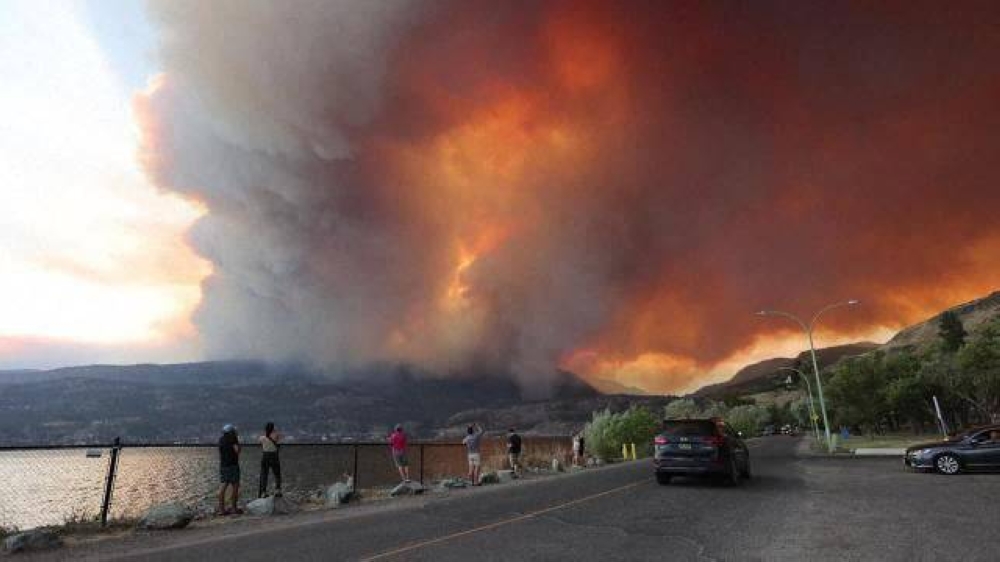Fires ravaging western Canada gained more ground on Sunday as two blazes merged and residents continued to evacuate.
Rapidly evolving wildfires threatened large parts of the scenic Okanagan Valley, including the city of Kelowna, British Columbia.
The situation in the popular boating and hiking destination was "highly dynamic," said Bowinn Ma, the province's minister of emergency management.
"Do not travel to fire-affected areas of the province for tourism," she added Sunday.
Around 30,000 people were under evacuation orders while another 36,000 were under alert to be ready to flee, she said.
Kelowna, a city of 150,000, was choked with thick smoke as it became the latest population center hit by one of the many wildfires scorching Canada this summer.
"It has been horrible to spend the week with this air. It is horrible to breathe," Mary Hicks, a 29-year-old IT worker who had been visiting the region from Montreal, told AFP on Sunday. "I really want to go home."
But she was stuck there for now, with her return flight canceled. The airport hopes to resume flights this week, depending on visibility.
"When I had to pack, in the moment I was crying, crying, crying," said April, 39, who with her two small children fled her home east of Kelowna and was staying in a hotel outside the city.
On the other side of Okanagan Lake, a number of homes on the outskirts of West Kelowna had been burned, though authorities remained optimistic that the city could avoid a full evacuation.
Some residents remained worried, however.
"My sister's boyfriend's house has burnt down. He lives in the West Kelowna side and it was so windy that the fire was spreading and they couldn't control it," said Bogi Bagosi, a 16-year-old student.
"It's kind of heartbreaking to watch the city burn down. They are doing the best to stop it but it is not enough."
- Yellowknife exodus -
Blazes in the neighboring Northwest Territories have meanwhile prompted the evacuation of regional capital Yellowknife, leaving the remote city of around 20,000 largely a ghost town.
Overnight rains brought some relief to Yellowknife on Saturday, however, "a little rain does not mean it's safe to come back home," warned Northwest Territories environment minister Shane Thompson.
Yellowknife official Chris Greencorn praised the work crews were doing to build defenses around the city, with large areas cleared to create firebreaks and pipes laid for sprinklers and water cannons.
The exodus from Yellowknife and elsewhere means two-thirds of the near-Arctic territory's population has been displaced, Thompson said.
The fires have caused "terrible loss," Prime Minister Justin Trudeau told reporters after meeting Yellowknife evacuees Friday as they arrived in Edmonton, Alberta, with no idea when they may return home.
At a news conference Sunday, Trudeau praised Canadians for their response to the evacuations.
"Canadians have stepped up have shown who they truly are as people are there for each other welcoming friends, neighbors, strangers, into their homes, into their communities, to support them," he said.
- Northwest US threat -
West Kelowna Fire Chief Jason Brolund announced on Saturday an emergency order halting non-essential visits to the area.
The order, which bans visitors from checking in at hotels and other temporary accommodations, covers Kelowna and the nearby towns of Kamloops, Oliver, Penticton and Vernon as well as Osoyoos near the US border.
"If you are currently in accommodations in these areas, we are asking you to voluntarily check out early and free up those spaces for evacuees and responders," Ma said.
Firefighters from Australia, Mexico, Brazil and Costa Rica, as well as eastern Canada, are assisting British Columbia to combat the blazes.
Across the border in the United States, several thousand people were forced to flee wildfires in Washington state, with at least one death reported, local media said.
An evacuation was ordered for Medical Lake, a town outside Spokane next to a US Air Force base, while a section of the vital I-90 highway was closed, authorities said.
Canada is experiencing a record-setting wildfire season, with official estimates of more than 14 million hectares (34.6 million acres) already burned -- roughly the size of Greece and almost twice the area of the last record of 7.3 million hectares. Four people have died so far.
Scientists say human-caused global warming is exacerbating natural hazards, making them both more frequent and more deadly.

